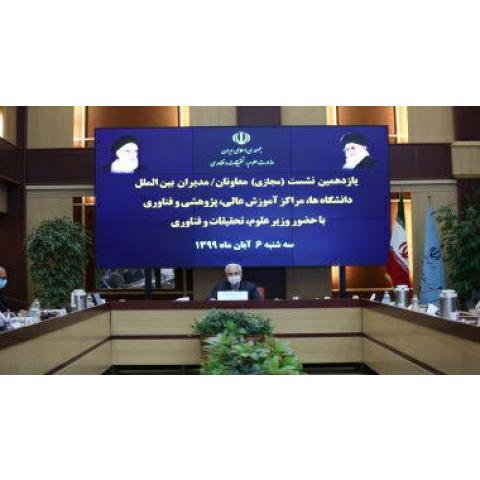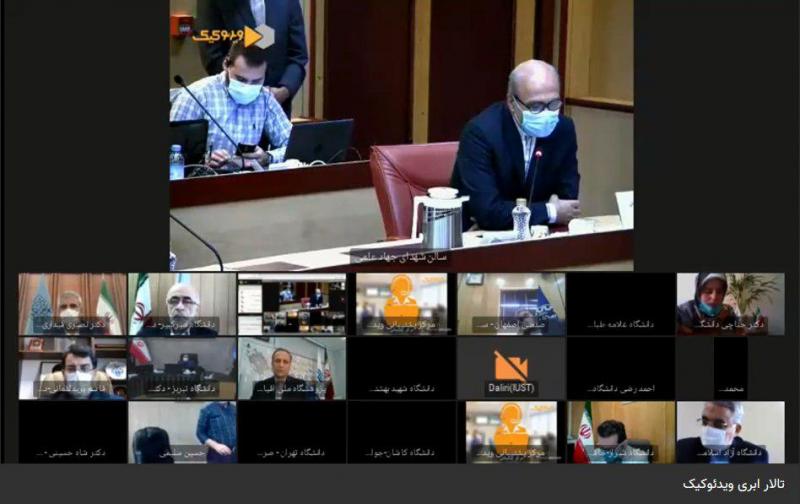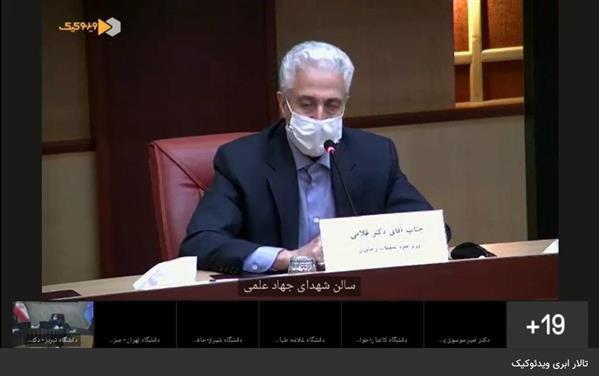
This meetingexploiting was held on Tuesday, October 27, 2020 aiming at having constant international interactions and effective communication with other countries and defining appropriate programs and strategies for exploiting our country's science and technology diplomacy during the COVID-19 crisis.

Ministers and deputies of MSRT and 130 university presidents, international deputies or directors of the universities and research centers attended this meeting whose discussion was centered on the three main areas of: 1. Performance of international scientific cooperation, 2. Attracting international students and elites, and 3. Joint research projects.
At the beginning of the meeting, some of the heads and international directors of universities presented their achievements in their international activities and expressed their views on improving the conditions of cooperation in the current situation.

Dr. Seyed Mehdi Abtahi, President of the University, Dr. Mohammad Javad Omidi, Acting President for International Affairs and Development of Technology Infrastructures, and Dr. Sima Fakhran, Director of the International Scientific Cooperation Center, were the attendees from IUT who reported on the activities of the Swiss Desk as the focal point of international collaborations in Iran.
The Minister of Science, Dr. Gholami stated that the development of higher education at the international level shows the capability of the country's scientific capacities and due to the outbreak of the coronavirus, a transition from the present to the time ahead has occurred for all countries that every country has taken advantages of the current conditions.
Emphasizing that there should be no retrospective view in scientific centers, the Minister of Science stated: "We should have a positive view of this event and work with a new approach. The achievements we have had in this period have been significant. Factors such as capabilities exchanged in the form of experience, development of technologies, the provision of infrastructure, physical facilities, etc., are the cases which could not be provided under normal circumstances."
He also added that one of the advantages of this course without the need for face-to-face and physical communication has led to the growth of our international relations in terms of quantity and quality in close or similar conditions to the best universities in the world. Also, in a situation where it was not possible for the academic scholars and students to have their regular activities due to oppressive sanctions and restrictions, we have been able to take effective steps to manifest ourselves to the world, and this should be further strengthened.
Dr. Gholami stated: "By minimizing the costs of international meetings, it is possible to benefit from various aspects, and a strong presence in the international collaborations shows the capabilities of the country's higher education system."
Dr. Hossein Salar Amoli, Deputy Minister for International Affairs, reviewed international scientific activities during COVID-19 pandemic in universities and research centers, and put emphasis on the need to find parallel solutions in the absence of professors and students. He also asserted that it is important to expand comprehensive scientific cooperation with China.
Dr. Salar Amoli said: "The coronavirus has directly affected scientific meetings, study opportunities, exchange of professors and graduate students, and we are looking for solutions to reduce its effects. We hope that a new form of international scientific cooperation will take place, especially through internet, and that we will take full advantage of the upcoming opportunities to strengthen scientific cooperation with foreign partners."
Dr. Salar Amoli added that although due to the spread of the coronavirus scientists and elites cannot travel to other countries, the use of technology has a key role in development of scientific cooperation. Universities have taken good measures in this regard, among which we can mention the scientific meetings held as webinars. Many meetings of bilateral or multilateral scientific groups are held virtually, and even the ministers and high-ranked officials of the countries attend these meetings, which is itself a great achievement for bilateral scientific cooperation for Iran.
The meeting closed on appreciating Dr. Kouhian, for his sincere years of service, and introducing Dr. Abdolhamid Alizadeh, as the new Deputy for International Scientific Cooperation Center at MSRT, by presence of Dr. Hossein Salar Amoli, Deputy Minister for International Affairs and Head of the International Scientific Cooperation Center.
The Minister of Science, Dr. Gholami stated that the development of higher education at the international level shows the capability of the country's scientific capacities and due to the outbreak of the coronavirus, a transition from the present to the time ahead has occurred for all countries that every country has taken advantages of the current conditions.
Emphasizing that there should be no retrospective view in scientific centers, the Minister of Science stated: "We should have a positive view of this event and work with a new approach. The achievements we have had in this period have been significant. Factors such as capabilities exchanged in the form of experience, development of technologies, the provision of infrastructure, physical facilities, etc., are the cases which could not be provided under normal circumstances."
He also added that one of the advantages of this course without the need for face-to-face and physical communication has led to the growth of our international relations in terms of quantity and quality in close or similar conditions to the best universities in the world. Also, in a situation where it was not possible for the academic scholars and students to have their regular activities due to oppressive sanctions and restrictions, we have been able to take effective steps to manifest ourselves to the world, and this should be further strengthened.
Dr. Gholami stated: "By minimizing the costs of international meetings, it is possible to benefit from various aspects, and a strong presence in the international collaborations shows the capabilities of the country's higher education system."
Dr. Hossein Salar Amoli, Deputy Minister for International Affairs, reviewed international scientific activities during COVID-19 pandemic in universities and research centers, and put emphasis on the need to find parallel solutions in the absence of professors and students. He also asserted that it is important to expand comprehensive scientific cooperation with China.
Dr. Salar Amoli said: "The coronavirus has directly affected scientific meetings, study opportunities, exchange of professors and graduate students, and we are looking for solutions to reduce its effects. We hope that a new form of international scientific cooperation will take place, especially through internet, and that we will take full advantage of the upcoming opportunities to strengthen scientific cooperation with foreign partners."
Dr. Salar Amoli added that although due to the spread of the coronavirus scientists and elites cannot travel to other countries, the use of technology has a key role in development of scientific cooperation. Universities have taken good measures in this regard, among which we can mention the scientific meetings held as webinars. Many meetings of bilateral or multilateral scientific groups are held virtually, and even the ministers and high-ranked officials of the countries attend these meetings, which is itself a great achievement for bilateral scientific cooperation for Iran.
The meeting closed on appreciating Dr. Kouhian, for his sincere years of service, and introducing Dr. Abdolhamid Alizadeh, as the new Deputy for International Scientific Cooperation Center at MSRT, by presence of Dr. Hossein Salar Amoli, Deputy Minister for International Affairs and

